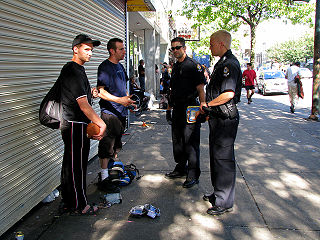
Theft is the act of taking another person's property or services without that person's permission or consent with the intent to deprive the rightful owner of it. The word theft is also used as a synonym or informal shorthand term for some crimes against property, such as larceny, robbery, embezzlement, extortion, blackmail, or receiving stolen property. In some jurisdictions, theft is considered to be synonymous with larceny, while in others, theft is defined more narrowly. A person who engages in theft is known as a thief.
Robbery is the crime of taking or attempting to take anything of value by force, threat of force, or by use of fear. According to common law, robbery is defined as taking the property of another, with the intent to permanently deprive the person of that property, by means of force or fear; that is, it is a larceny or theft accomplished by an assault. Precise definitions of the offence may vary between jurisdictions. Robbery is differentiated from other forms of theft by its inherently violent nature ; whereas many lesser forms of theft are punished as misdemeanors, robbery is always a felony in jurisdictions that distinguish between the two. Under English law, most forms of theft are triable either way, whereas robbery is triable only on indictment. The word "rob" came via French from Late Latin words of Germanic origin, from Common Germanic raub "theft".

In law, fraud is intentional deception to deprive a victim of a legal right or to gain from a victim unlawfully or unfairly. Fraud can violate civil law or criminal law, or it may cause no loss of money, property, or legal right but still be an element of another civil or criminal wrong. The purpose of fraud may be monetary gain or other benefits, such as obtaining a passport, travel document, or driver's license. In cases of mortgage fraud, the perpetrator may attempt to qualify for a mortgage by way of false statements.

Forgery is a white-collar crime that generally consists of the false making or material alteration of a legal instrument with the specific intent to defraud. Tampering with a certain legal instrument may be forbidden by law in some jurisdictions but such an offense is not related to forgery unless the tampered legal instrument was actually used in the course of the crime to defraud another person or entity. Copies, studio replicas, and reproductions are not considered forgeries, though they may later become forgeries through knowing and willful misrepresentations.
Larceny is a crime involving the unlawful taking or theft of the personal property of another person or business. It was an offence under the common law of England and became an offence in jurisdictions which incorporated the common law of England into their own law, where in many cases it remains in force.
Embezzlement is a term commonly used for a type of financial crime, usually involving theft of money from a business or employer. It often involves a trusted individual taking advantage of their position to steal funds or assets, most commonly over a period of time.
Criminal conversion is a crime, limited to parts of common law systems outside England and Wales, of exerting unauthorized use or control of someone else's property, at a minimum personal property, but in some jurisdictions also applying to types of real property, such as land or to patents, design rights and trademarks. It differs from theft in that it does not include the element of intending to deprive the owner of permanent possession of that property. As such, it is a lesser offense than the crime of theft. Criminal conversion specifies a type of conversion in that it involves criminal law, not civil law.
Bank fraud is the use of potentially illegal means to obtain money, assets, or other property owned or held by a financial institution, or to obtain money from depositors by fraudulently posing as a bank or other financial institution. In many instances, bank fraud is a criminal offence.

The Theft Act 1968 is an act of the Parliament of the United Kingdom. It creates a number of offences against property in England and Wales.
Mail fraud and wire fraud are terms used in the United States to describe the use of a physical or electronic mail system to defraud another, and are U.S. federal crimes. Jurisdiction is claimed by the federal government if the illegal activity crosses interstate or international borders.
The "Bloody Code" was a series of laws in England, Wales and Ireland in the eighteenth and early nineteenth centuries which mandated the death penalty for a wide range of crimes. It was not referred to by this name in its own time; the name was given later owing to the sharply increased number of people given the death penalty, even for crimes considered minor by later standards.
Uttering is a crime involving a person with the intent to defraud that knowingly sells, publishes or passes a forged or counterfeited document. More specifically, forgery creates a falsified document and uttering is the act of knowingly passing on or using the forged document.
Bailey v. Alabama, 219 U.S. 219 (1911), was a United States Supreme Court case that overturned the peonage laws of Alabama.
"Deception" was a legal term of art used in the definition of statutory offences in England and Wales and Northern Ireland. It is a legal term of art in the Republic of Ireland.

Possession of stolen goods is a crime in which an individual has bought, been given, or acquired stolen goods.
Property crime is a category of crime, usually involving private property, that includes, among other crimes, burglary, larceny, theft, motor vehicle theft, arson, shoplifting, and vandalism. Property crime is a crime to obtain money, property, or some other benefit. This may involve force, or the threat of force, in cases like robbery or extortion. Since these crimes are committed in order to enrich the perpetrator they are considered property crimes. Crimes against property are divided into two groups: destroyed property and stolen property. When property is destroyed, it could be called arson or vandalism. Examples of the act of stealing property is robbery or embezzlement.
Obtaining property by deception was formerly a statutory offence in England and Wales and Northern Ireland.

The criminal law of the United States is a manifold system of laws and practices that connects crimes and consequences. In comparison, civil law addresses non-criminal disputes. The system varies considerably by jurisdiction, but conforms to the US Constitution. Generally there are two systems of criminal law to which a person maybe subject; the most frequent is state criminal law, and the other is federal law.

The Larceny Act 1861 was an Act of the Parliament of the United Kingdom of Great Britain and Ireland. It consolidated provisions related to larceny and similar offences from a number of earlier statutes into a single Act. For the most part these provisions were, according to the draftsman of the Act, incorporated with little or no variation in their phraseology. It is one of a group of Acts sometimes referred to as the Criminal Law Consolidation Acts 1861. It was passed with the object of simplifying the law. It is essentially a revised version of an earlier consolidation Act, the Larceny Act 1827 (7 & 8 Geo. 4. c. 29), incorporating subsequent statutes.

United States v. LaMacchia 871 F.Supp. 535 was a case decided by the United States District Court for the District of Massachusetts which ruled that, under the copyright and cybercrime laws effective at the time, committing copyright infringement for non-commercial motives could not be prosecuted under criminal copyright law.








